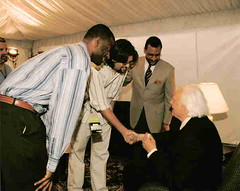Student protests and education
Ben wrestles with the educational impact skipping school to protest has on the student activists in California. I posed a question in response, which I'm reposting here as well:
Is there a way for educators to harness the energy of the protestors in the classroom? That is, keep the immigration conversation going, but apply it to particular subjects such as: social studies teachers assigning current event projects; math teachers examining the economics of immigration; literature profs examine the voices of protest and dissent. Many of our struggling students struggle because our schools can’t/won’t engage them about things that matter to them. Obviously the immigration issue has struck a nerve. Hundreds of thousands of high schoolers are now engaged. Does this create an opportunity?What do you think?













1 Comments:
I decided to comment on your post rather than comment on my own
I think there is a way. My wife tells me about the disruption of the classroom and I know at her school the proposition was copied and given to each teacher to read and discuss Monday so the students were informed and to ask questions.
I see another opportunity to harness this passion and engagement:
I have a Catholic friend who is a theology teacher in a magnet high school and he gives students extra credit to get involved in social causes and on walks for breast cancer, AIDS, and other causes. He gets them involved with issues the church can rally around and then he's there with his youth, bringing meals to AIDS victims, walking for breast cancer, and serving meals to the homeless. He teaches his youth that these are reasonable things that they can get involved and engaged in making a difference in their own community in positive ways. Although he gives them multiple opportunities throughout the year to do these activities, the students end up finding their own or continuing at placees they've served at before, and the engagement has begun. It is no longer about school, but about doing what they believe to make a difference in a way that is tangible for them. He strongly believes in relating the gospel in a social way because it's something the student's can grasp and they can see outside their environment to see how bad life is for others, and even if they live in a bad situation- knowing it could always be worse and that they have something they can offer in the form of their time and energy. The benefit he always tells me is that his youth consistantly, year after year, want to do more and more because they see the impact.. in the lives they touch or serve and more importantly in themselves.
Post a Comment
<< Home